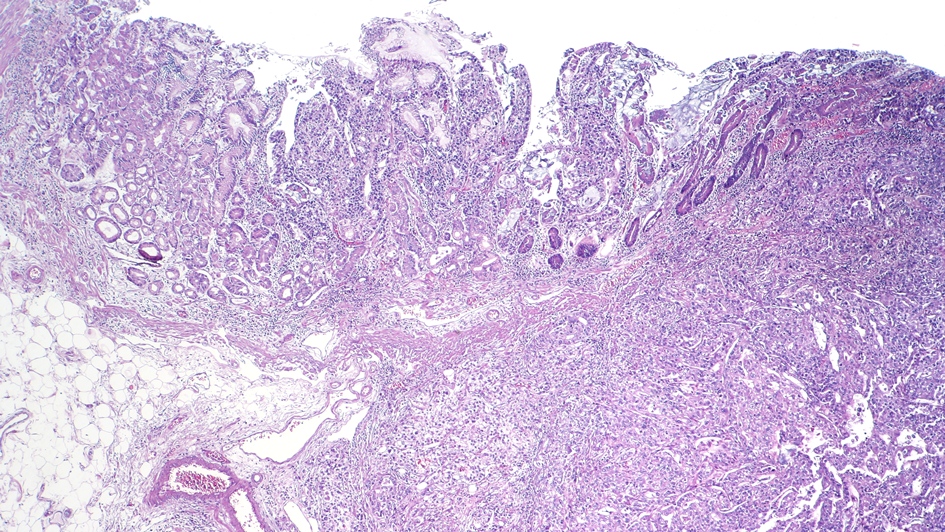
Image: Stomach cancer cells under a microscope. Source: Wikimedia Commons Licence:
CC BY-SA 4.0
A new test could improve care for patients with stomach or oesophageal cancer by predicting their likelihood of relapse after chemotherapy and surgery.
Patients found to be at low risk of relapse according to the test lived twice as long as those judged as at high risk – allowing doctors to make important decisions about the treatment of the two groups.
A team at The Institute of Cancer Research, London, and The Royal Marsden NHS Foundation Trust, developed the test after finding that assessing seven genes together gave crucial information about cancer’s future behaviour.
Doctors could use the test to assess whether chemotherapy – which often has unpleasant side-effects – is beneficial for patients with stomach or oesophageal cancer after receiving both pre-operative chemotherapy and surgery to prolong survival.
The study was funded by The Institute of Cancer Research (ICR) and is published today (Tuesday) in Annals of Oncology.
Analysis of samples from phase III trial
Each year, around 15,000 people are diagnosed with cancers of the oesophagus or stomach in the UK.
Most patients undergo chemotherapy to shrink the tumour prior to surgery, often followed by a second round to mop up remaining cancer cells – but even with this treatment about 50 per cent relapse.
The researchers analysed samples from patients who took part a large phase III clinical trial, funded by the Medical Research Council, in which patients received either chemotherapy prior to surgery or surgery alone, as well as data from a separate Cancer Research UK-funded follow-up study – to judge whose cancers were most likely to come back.
The tissue collection for this study was funded by a grant from the NIHR Biomedical Research Centre at The Royal Marsden NHS Foundation Trust and The Institute of Cancer Research.
Our latest research shows that within the next decade, we can make acute lymphoblastic leukaemia preventable. Your support will help us make this disease a thing of the past.
Find out more
New seven gene test
Scientists at the ICR linked seven genes to the survival outcome of patients who had undergone both chemotherapy and surgery – including whether they were likely to relapse or not.
The researchers created a seven gene test for these patients who received both chemotherapy and surgery, and used it to place them in groups at high or low risk of relapse.
Two of the genes, epidermal growth factor receptor (EGFR) and the CD44, have been previously associated with drug resistance and worse survival in gastric cancer patients who have been treated with chemotherapy.
The study found that the average survival time for those in the high risk group was 20.4 months, compared with 39.4 months in the low risk group.
In future, doctors could therefore use this genetic test to select patients for clinical trials which develop new treatments for high risk patients, or decide to use less intensive treatment after chemotherapy and surgery for low risk patients.
Currently the only indicator of how well a patient will respond to the combination of chemotherapy and surgery in this cancer type is its spread to the lymph nodes, but this does not indicate their risk of relapse. This new test works independently of the lymph node status to predict a patient’s risk of relapse.
'Exciting new test which indicates their risk of relapse'
Lead researcher Dr Anguraj Sadanandam, Team Leader in Systems and Precision Cancer Medicine at The Institute of Cancer Research, London, said:
“By analysing the genetic profile of tumours in patients who have received chemotherapy followed by surgery, we developed an exciting new test which indicates their risk of relapse.
“Our test could help select patients who are at high risk of relapse after surgery, to allow new therapies to be developed for this set of patients – with the potential to change the future standard of care for this subset.
“If it works on a wider scale, this approach to treating gastroesophageal cancer could personalise standard clinical treatment and improve quality of life after treatment.”
Co-first author Dr Elizabeth Smyth, who was a Clinical Research Fellow at The Royal Marsden NHS Foundation Trust at the time of this study and is currently a Consultant Oncologist at Cambridge University Hospital NHS Foundation Trust, said:
“The next step is to validate these findings in patients treated with the most common type of chemotherapy, called Docetaxel-OxaliplatinFluorocil (FLOT) chemotherapy.
“Analysing risk of relapse following chemotherapy brings us one step closer to personalised treatments in this group of patients, and in the UK we hope to provide a national framework of genetically powered clinical trials in patients with gastrooesophageal cancer.”
Staying 'one step ahead of cancer'
Professor Paul Workman, Chief Executive at The Institute of Cancer Research, London, said:
“It’s really pleasing to see genetic research put to use to devise a new test that could predict how likely a patient is to relapse.
“This is the latest example of our programme of research to stay one step ahead of cancer, by understanding better how it is likely to behave in response to treatment.
“It could help personalise treatment to improve survival, potentially allowing us in future to slow or prevent relapse. I hope that further studies can bring this test closer to routine use, to start guiding personalised strategies to cancer treatment.”